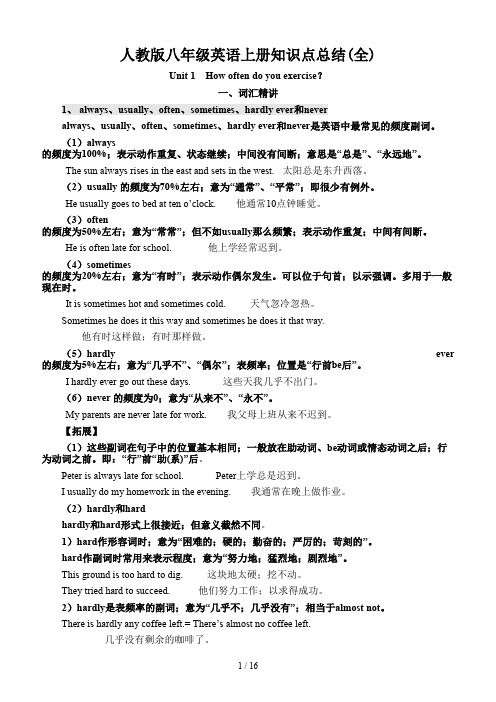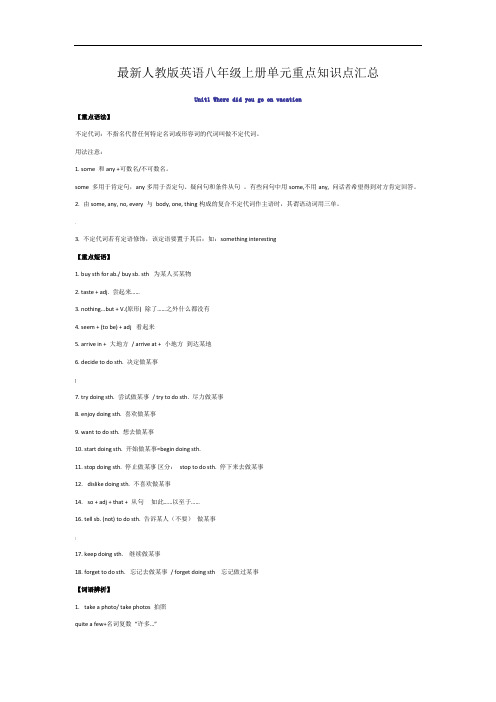人教版英语八年级上册第一单元知识点归纳
英语人教版八年级上unit1知识点笔记

Un i t 1 Wh e re d id yo u g o on v acation?1•一般过去时考点1:如何判断一般过去时?考点2:肯定句变否定句。
考点3:变一般疑问和特殊疑问句。
2•复合不定代词/副词构成: _________ _________ ___________ _________其中:(no one意思“______ ”指 __ ,与_________ 同义,且与of连用,做主语谓语用单三。
回答引起的特殊疑问句时要用no one.none意思“ ___ ”,指____________ ,且 __ 与of连用。
谓语单,复形式皆可。
回答 _________ 引起的特殊疑问句时要用none;-anyone意思" _____ ”扌旨___ ,与 __ 同义,且_____ 与of连用。
_any one 意思" ____ ”扌旨___ ,与 __ 同义,且_____ 与of 连用。
nothing= _________________用法:① 复合不定代词做主语,谓语动词用 ________ •②当adj.修饰不定代词要_________ •③ 当不定代词中含有some通常用于__________ ;含有any通常用于_______________我自己myself你自己他自己她自己它自己我们自己你们自己他们自己反身代词在句中可用作动词宾语、介词宾语、表语和同位语等,如:She can dress herself.作动词宾语)That?poor?boy?was?myself.(用作表语)Thefatherhimselfhassomething wrong.(同位语:句中常置于名词、代词之后或句子末尾We clean the room ourselves.(同位语:句中常置于名词、代词之后或句子末尾常用短语:穿衣服;?玩得快乐;随便吃;随便用;2.few 意为___________,修饰__________ 名词,倾向于否定。
人教版八年级上册英语知识点归纳

⼈教版⼋年级上册英语知识点归纳⼋年级英语上册知识点总结Unit 1: How often do you exercise?【复习⽬标】会使⽤频率副词及短语;能描述课余时间的活动安排;会描述基本饮⾷结构。
【语⾔⽬标】● What do you usually do on weekends? I sometimes go to the beach.● How often do you eat vegetables? Every day● Most students do homework every day.【重点词汇】●always, usually , often, sometimes , hardly , ever, never.●how often, once , twice , three times a week , every day.【应掌握的词组】1. go to the movies 去看电影2. look after = take care of 照顾3. surf the internet 上⽹4. healthy lifestyle 健康的⽣活⽅式5. go skate boarding 去滑板6. keep healthy=stay healthy 保持健康7. exercise=take(much)exercise=do sports 锻炼8. eating habits 饮⾷习惯9. take more exercise 做更多的运动10. the same as与什么相同11. be different from 不同12. once a month ⼀⽉⼀次13. twice a week ⼀周两次14. make a difference to 对什么有影响15. how often 多久⼀次16. although = though 虽然17. most of the students=most students18. shop=go shopping=do some shopping 购物19. as for ⾄于20. activity survey 活动调查21. do homework 做家庭作业22. do housework 做家务事23. eat less meat吃更少的⾁24. junk food 垃圾⾷物25. be good for 对什么有益26. be bad for 对什么有害27. want to do sth 想做某事28. want sb to do sth 想某⼈做某事29. try to do sth 尽量做某事30. come home from school 放学回家31. of course = certainly = sure 当然32. get good grades 取得好成绩33. some advice34. hardly=not nearly / almost not ⼏乎不35. keep/be in good health 保持健康36. b e stressed out 紧张的,有压⼒的37. take a vacation 去度假48. g et back 回来【应掌握的句⼦】1. How often do you exercise? 你(你们)多久锻炼⼀次⾝体?How often + 助动词do(does 或did) + 主语+ do sth.? 疑问词how often 是问频率(多久⼀次),(在这⾥助动词do(does 或did) 是起帮助构成疑问的作⽤)与⼀般现在时或⼀般过去时连⽤,回答⼀般是⽤表⽰频率的副词,如:once, twice, three times , sometimes, often, quite, often, never, every day, once a week , twice a month , three times a month , three or four times a month 等。
人教版英语八年级上第一单元Unit1Wheredidyougoonvacation知识点梳理

人教版英语八年级上第一单元Unit1Wheredidyougoonvacation知识点梳理Unit 1 Where did you go on vacation?知识梳理一、词型转换Section A1.wonder →(adj.) wonderful2.I →(反身代词) myself3.you →(反身代词) yourself4.yourself →(pl.) yourselves5.seem →(pt.) seemedSection B1.activity →(pl.) activities2.decide →(n.) decision3.try →(pt.) tried4.bike →(同义词) bicycle5.build →(n.) building6.difference →(adj.) different7.like →(反义词) dislike8.below →(反义词) above二、短语归纳Section A1.go to Central Park 去中央公园2.on vacation 在度假3.buy something special 买特别的东西4.meet someone interesing 遇见有趣的人5.go out with someone 和某人一起出去6.take quite a few photos 拍相当多的照片7.most of the time 大多数时间8.go shopping 去购物9.keep a diary 记日记10.of course 当然;自然Section B1.have a good time 玩得高兴;过得愉快2.go to the beach 去海滩3.feel like 感觉像4.the houses of the Chinese traders 中国商人的房子5. a lot of new buildings 许多新的建筑物6.in the past 在过去7.over an hour 一个多小时8.too many people 太多的人9.get to the top 到达顶部10.because of the bad weather 因为不好的天气11.one bowl of fish 一碗鱼肉12.another two hours 另外两个小时13.the top of the hill 山顶14.learn something important 学习重要的东西Self Check1.go to the countryside 去乡下2.in the shopping center 在购物中心3.have a fun time 玩得高兴;过得愉快4.after three hours 三个小时以后5.keep going 一直走6.twenty minutes later 20分钟后重点句子1.Where did you go on vacation?你去哪儿度假的?2.Long time no see.好久不见。
人教版英语八年级上册unit 1

人教版英语八年级上册unit 1一、重点单词。
1. anyone.- 词性:不定代词,意为“任何人”,用于否定句和疑问句中。
例如:Did you meet anyone interesting at the party?(你在聚会上遇到有趣的人了吗?)2. anywhere?- 词性:副词,意为“在任何地方;无论何处”。
例如:I can't find my keys anywhere.(我到处都找不到我的钥匙。
)3. wonderful.- 词性:形容词,意为“精彩的;绝妙的”。
例如:We had a wonderful timeat the concert.(我们在音乐会上度过了一段美妙的时光。
)4. few.- 词性:形容词,意为“不多;很少”,修饰可数名词复数,表示否定意义。
例如:There are few apples on the tree.(树上几乎没有苹果了。
)- 区别:a few表示“一些;几个”,表示肯定意义。
例如:There are a few students in the classroom.(教室里有几个学生。
)5. most.- 词性:形容词,意为“最多的;大多数的”。
例如:Most students like English.(大多数学生喜欢英语。
)- 也可作副词,意为“最;非常”。
例如:This is the most beautiful flower.(这是最漂亮的花。
)6. something.- 词性:不定代词,意为“某事;某物”,用于肯定句中。
例如:I have something important to tell you.(我有重要的事情要告诉你。
)7. nothing.- 词性:不定代词,意为“没有什么;没有一件东西”。
例如:There is nothing in the box.(盒子里什么都没有。
)8. everyone.- 词性:不定代词,意为“每人;人人;所有人”。
人教版八年级英语上册知识点总结(全)

人教版八年级英语上册知识点总结(全)Unit 1 How often do you exercise?一、词汇精讲1、 always、usually、often、sometimes、hardly ever和neveralways、usually、often、sometimes、hardly ever和never是英语中最常见的频度副词。
(1)always的频度为100%;表示动作重复、状态继续;中间没有间断;意思是“总是”、“永远地”。
The sun always rises in the east and sets in the west. 太阳总是东升西落。
(2)usually 的频度为70%左右;意为“通常”、“平常”;即很少有例外。
He usually goes to bed at ten o’clock. 他通常10点钟睡觉。
(3)often的频度为50%左右;意为“常常”;但不如usually那么频繁;表示动作重复;中间有间断。
He is often late for school. 他上学经常迟到。
(4)sometimes的频度为20%左右;意为“有时”;表示动作偶尔发生。
可以位于句首;以示强调。
多用于一般现在时。
It is sometimes hot and sometimes cold. 天气忽冷忽热。
Sometimes he does it this way and sometimes he does it that way.他有时这样做;有时那样做。
(5)hardly ever 的频度为5%左右;意为“几乎不”、“偶尔”;表频率;位置是“行前be后”。
I hardly ever go out these days. 这些天我几乎不出门。
(6)never 的频度为0;意为“从来不”、“永不”。
My parents are never late for work. 我父母上班从来不迟到。
人教版八年级上册英语第一单元知识点整理

人教版八年级上册英语第一单元知识点梳理Unit 1 Where did you go on vacation?短语整理•quite a few 相当多;不少•of course 当然;自然•feel like 给……的感觉;感受到•because of 因为•on vacation 在度假中•play volleyball 打排球•study for tests 为准备考试而努力学习•keep a diary 写日记•take some photos 拍照片重点句子及解析•Did you buy anything special? 你买了什么特别的东西吗?o anything是用于指代事物的复合不定代词,与形容词连用时,形容词应后置•We took quite a few photos there. 我们在那里拍了好多照片。
o quite a few vs. a few▪quite a few: I still have quite a few in the bookcase. 我的书柜里还有很多书。
▪ a few: There are only a few books on the table. 桌子上只有几本书。
•What a difference a day makes! 一天的差异是多么大呀!•And because of the bad weather, we couldn’t see anything below. 并且因为糟糕的天气,底下的东西我们什么都看不到。
o because of vs. because▪because of: 介词短语,后面可接名词、代词或名词性短语•We can’t play basketball outside today because of therain.▪because: 连词,后面接句子•I can’t come to your party because I’m going away thisweekend.。
完整版)人教版八年级英语上册第一单元知识点总结

完整版)人教版八年级英语上册第一单元知识点总结Grade: 8th student name: Tutoring subject: English Teaching teacher: Teacher ShaoTopic: Unit 1 Where did you go on n?Type of class: Preview class。
synchronous class。
review class。
exercise classKey points:1.Mastering key phrases2.Understanding the usage of indefinite pronouns3.Analyzing words and phrasesTeaching content:1.Important grammar pointsUnit 1 Where did you go on n。
go on nstay at homego to the mountainsgo to the beachvisit museumsquite a fewstudy formost of the timetaste goodhave a good timefeel likego shoppingwalk aroundbecause ofone bowl ofthe next dayfind outgo ontake photossomething importantup and downcome upbuy sth。
for sb。
/ buy sb。
sth。
taste + adj。
look + adj。
nothing but + verbseem + (to be) + adj。
arrive in + big place / arrive at + small place decide to do sth。
try doing sth。
人教版英语八年级上册重点知识点汇总

最新人教版英语八年级上册单元重点知识点汇总Unit1 Where did you go on vacation【重点语法】不定代词:不指名代替任何特定名词或形容词的代词叫做不定代词。
用法注意:1. some 和any +可数名/不可数名。
some 多用于肯定句,any多用于否定句、疑问句和条件从句。
有些问句中用some,不用any, 问话者希望得到对方肯定回答。
2. 由some, any, no, every 与body, one, thing构成的复合不定代词作主语时,其谓语动词用三单。
.3. 不定代词若有定语修饰,该定语要置于其后:如:something interesting【重点短语】1. buy sth for ab./ buy sb. sth 为某人买某物2. taste + adj. 尝起来……3. nothing...but + V.(原形) 除了……之外什么都没有4. seem + (to be) + adj 看起来5. arrive in + 大地方/ arrive at + 小地方到达某地6. decide to do sth. 决定做某事]7. try doing sth. 尝试做某事/ try to do sth. 尽力做某事8. enjoy doing sth. 喜欢做某事9. want to do sth. 想去做某事10. start doing sth. 开始做某事=begin doing sth.11. stop doing sth. 停止做某事区分:stop to do sth. 停下来去做某事12. dislike doing sth. 不喜欢做某事14. so + adj + that + 从句如此……以至于……16. tell sb. (not) to do sth. 告诉某人(不要)做某事;17. keep doing sth. 继续做某事18. forget to do sth. 忘记去做某事/ forget doing sth 忘记做过某事【词语辨析】1. take a photo/ take photos 拍照quite a few+名词复数“许多…”2. seem + 形容词看起来…... You seem happy toda y.seem + to do sth. 似乎/好像做某事 I seem to have a coldIt seems + 从句似乎..…. It seems that no one believe you.【seem like ... 好像,似乎….. It seems like a good idea.3. arrive in +大地点= get to= reach+地点名“到达......”arrive at +小地点(注:若后跟地点副词here/there/home, 介词需省略,如:arrive here; get home)4. feel like sth 感觉像…feel doing sth. 想要做某事5. wonder(想知道)+疑问词(who, what, why)引导的从句。
- 1、下载文档前请自行甄别文档内容的完整性,平台不提供额外的编辑、内容补充、找答案等附加服务。
- 2、"仅部分预览"的文档,不可在线预览部分如存在完整性等问题,可反馈申请退款(可完整预览的文档不适用该条件!)。
- 3、如文档侵犯您的权益,请联系客服反馈,我们会尽快为您处理(人工客服工作时间:9:00-18:30)。
2. Still no one seemed to be bored.
seem作连系动词或不及物动词,意为“似乎,好像”
(1)seem+ 形容词“看起来…….” Li Lei seems happy today. Mr. Black seemed to be quite happy.
(2)seem to do “似乎,好像做某事” The young man seemed to change much.
in today’s newspaper?
-------- No. I think everything in it is boring.
A. interesting anything
B. somebody interesting
C. interesting something
D. anything interesting
I can’t decide the date of the meeting. We decided to go there. They can’t decide whom to invite. We decided that we would not go to the party tonight. (2)作不及物动词,常与on 或upon 连用。 She decided on the red shoes.
with it.
A. boring ; boring
B. bored ; bored ; boring
谢谢观看!
例题1.-------- There are dark clouds, and the wind is blowing strongly.
--------It
that a typhoon.
A. feels
B. sounds
C. seems
D. looks
3. decide “决定”
(1)作及物动词+n\to do \特殊疑问句\that引导宾语从句
somebody interesting 一些有趣的人 anybody hard-working 任何努力的人 something wonderful 一些精彩的事 anything different 任何不同的事 nothing important 没什么重要的事
例题1.-------- Is there
Unit 1 知识点总结
1. Did you do anything special last month?
anything special “特别的事情” 。something\anything\nothing\somebody\ Anybody等为复合不定代词,当形容词修饰复合不定代词时,形容词要放 在复合不定代词的后面。
(3)seem like “似乎,好像……..” It seems like a good idea.
2. Still no one seemed to be bored.
seem作连系动词或不及物动词,意为“似乎,好像”
(1)seem+ 形容词“看起来…….” (2)seem to do “似乎,好像做某事” (3)seem like “似乎,好像……..”
例题1.-------- Tom has decided
a part-time job after he
graduates from school.
A. do B. to do C. did D. doing
例题2.-------- The new magazine was so
--------Yes, I felt
